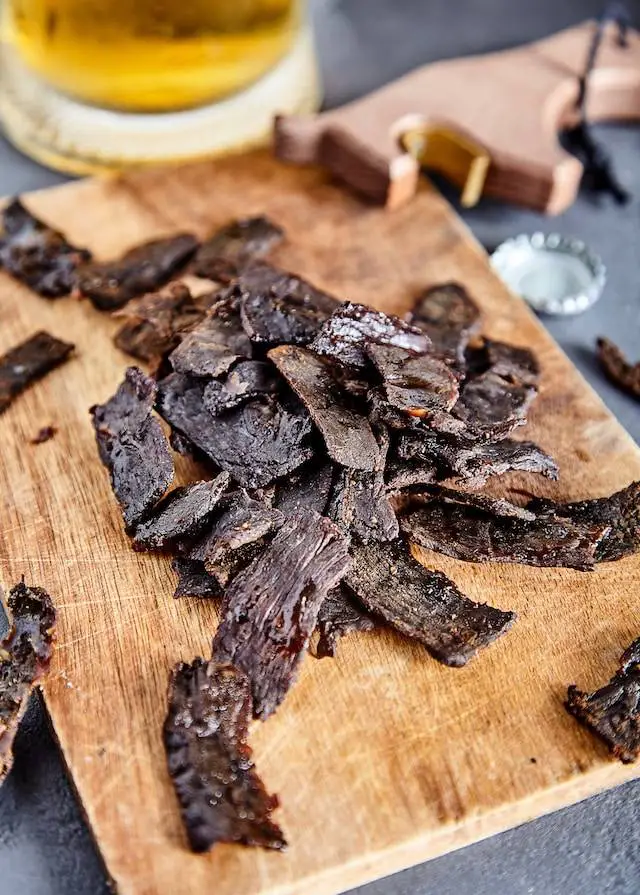Beef jerky is a popular snack food made from strips of lean meat that have been dried and seasoned.
While it can be a tasty and convenient snack option, eating too much beef jerky can have some negative effects on your health. In this article, we’ll explore what happens if you eat too much beef jerky.
Contents
High In Sodium
One of the main concerns with eating too much beef jerky is its high sodium content. Most beef jerky brands are high in salt to act as a preservative and to enhance the flavor. However, a high-sodium diet can lead to high blood pressure, heart disease, and stroke.
High In Protein
While protein is an important nutrient for building and repairing muscles, consuming too much protein can also have negative effects on your health.
Excessive protein intake can put a strain on your kidneys and liver, as they are responsible for filtering and processing the excess protein. It can also lead to dehydration and increased urination.
Preservatives
Many beef jerky brands contain preservatives like nitrites and nitrates to prolong the shelf life and prevent bacterial growth. However, these preservatives have been linked to health problems like cancer and may cause allergic reactions in some people.
High In Calories
Beef jerky is also high in calories, especially if it contains added sugar or other flavorings. Consuming too many calories can lead to weight gain and an increased risk of obesity-related health problems like diabetes, heart disease, and certain cancers.
Difficult To Digest
The drying and curing process used to make beef jerky can make it tough and difficult to digest. Eating too much tough, dried meat can cause constipation, bloating, and other digestive issues.

While beef jerky can be a tasty and convenient snack option, it’s important to consume it in moderation. Eating too much beef jerky can lead to high sodium intake, excessive protein consumption, preservatives, high calories, and digestive issues.
It’s best to opt for healthier snack alternatives like fresh fruit, vegetables, or nuts to ensure a balanced diet and minimize health risks.
Health Benefits Of Eating Them In Moderation
Beef jerky is a popular snack food made from lean meat that has been dried and seasoned. While there are some negative health effects associated with overconsumption, there are also some potential health benefits to eating beef jerky in moderation.
Here are a few health benefits of eating beef jerky:
- High in Protein: Beef jerky is a great source of protein, which is essential for building and repairing muscles, as well as maintaining healthy skin, hair, and nails. A serving of beef jerky can provide up to 9 grams of protein, which can help keep you feeling full and satisfied between meals.
- Low in Fat: Beef jerky is also low in fat, particularly saturated fat, which can contribute to high cholesterol and heart disease. In fact, some brands of beef jerky are made with extra-lean cuts of meat, which can help you get the protein you need without the excess fat.
- Rich in Nutrients: Beef jerky is a good source of several essential vitamins and minerals, including iron, zinc, and vitamin B12. Iron is important for healthy blood circulation and energy levels, while zinc supports a healthy immune system and wound healing. Vitamin B12 is important for maintaining healthy nerves and red blood cells.
- Convenient and Portable: Beef jerky is a convenient and portable snack option that can be easily carried with you on-the-go. It doesn’t require refrigeration, making it a great choice for camping trips, road trips, or long hikes.
- Low in Carbs: Beef jerky is naturally low in carbohydrates, which can make it a good snack option for people following a low-carb or ketogenic diet.
While there are some potential health benefits to eating beef jerky, it’s important to consume it in moderation and be aware of its high sodium and preservative content.
Opt for brands that use natural seasonings and avoid those with added sugars or artificial flavors. As with any snack, it’s best to balance it with a variety of other healthy foods to ensure a balanced diet.
Does It Mess With Your Cholesterol?
Beef jerky, like all meat products, contains cholesterol. However, whether or not beef jerky specifically will mess with your cholesterol levels depends on how much you consume and your overall diet.
Eating beef jerky in moderation as part of a healthy diet is unlikely to significantly affect your cholesterol levels. However, if you consume large amounts of beef jerky or if your diet is already high in saturated and trans fats, it may contribute to high cholesterol levels.

Additionally, many commercial brands of beef jerky are high in sodium, which can also contribute to high blood pressure and increased risk of heart disease. It’s important to read the nutrition labels and opt for brands that are lower in sodium and made with lean cuts of meat.
Good Source Of Zinc
Beef jerky is a good source of zinc, which is an essential mineral that plays a role in various bodily functions such as immune system function, wound healing, and DNA synthesis.

A one-ounce serving of beef jerky can provide about 20% of the daily recommended intake of zinc for adults.
Zinc is not only found in beef jerky but also in other sources such as meat, poultry, seafood, dairy, nuts, and seeds. It’s important to have a balanced and varied diet to ensure you’re getting enough zinc and other essential nutrients.
Conclusion
Beef jerky can be a tasty and convenient snack, and it can provide a good source of protein and zinc. However, it’s important to consume it in moderation as part of a balanced and healthy diet.
Many commercial brands of beef jerky can be high in sodium, which can contribute to high blood pressure and increased risk of heart disease if consumed in excess. It’s best to read the nutrition labels and opt for brands that are lower in sodium and made with lean cuts of meat.
If you have concerns about your cholesterol levels or overall health, it’s important to consult with a healthcare provider and a registered dietitian who can help you develop a personalized plan to improve your health.
